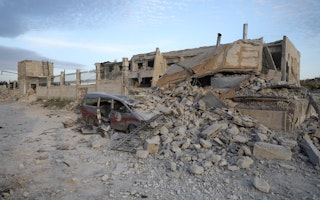Exposing the Real Ravages of War
By Shihab Halep & Emily Tripp

In the early hours of September 20, a man and his son were shot and killed in Al Baydar, a village in Raqqa, Syria. The Euphrates Post, a local media organization, published their images on Facebook alongside their names.
In the following days, at least a dozen local journalists and individuals reported that the father and son were civilians, but had been mistakenly killed during a raid conducted by the Syrian Democratic Forces with support from the U.S. military in their attempt to arrest a member of ISIS. The story received little coverage outside of Syria.
This incident is just one of over 2,000 entries in our archive documenting allegations of civilian harm resulting from actions conducted in the war against ISIS by the U.S. and its allies. While much of the world’s attention has moved away from these actions in the Middle East, incidents like these are typical of claims made by local communities of sustained levels of civilian harm in this ongoing conflict—claims often dismissed as “collateral damage” by those responsible.
Our organization, Airwars, was established nearly 10 years ago to counter this narrative. Our founders, Chris Woods and Basile Simon, wanted to build a rigorous mechanism for recording all casualties caused in conflict—to collect and preserve the stories of the local communities caught in the cross fire, and use those stories to force change in the way wars were being waged. Chris previously spent years working for the BBC as a senior producer; his work took him to Iraq, Syria, Palestine and Israel, as well as to Afghanistan. Concerned by the discrepancies he saw between the realities of war and the claims made by militaries, he went on to set up the award-winning Drones Project at the Bureau of Investigative Journalism, before establishing Airwars.
Learning from local civil society organizations across the region—like Iraq Body Count, the Syrian Network for Human Rights, and Syria’s Violations Documentation Centre, which were already fastidiously tracking civilian harm, we developed a methodology that would bring together all these sources alongside other open-source claims to create baseline estimates of casualty counts and build out a permanent public record.
To date, our archive of civilian harm across Syria, Iraq, Yemen, Libya, Israel, and the Gaza Strip includes over 9,000 individual incidents, with over 19,000 individual names recorded, and almost 60,000 alleged deaths assessed. Our innovative methodology has been reviewed by leading experts at Every Casualty Counts, and we have become a trusted independent source for casualty estimates. Our research into civilian harm caused by the U.S. in the so-called forever wars, for example, was used in the opening remarks of a Senate Judiciary Committee hearing earlier this year. Our analysis of the Pentagon’s latest annual report on civilian deaths caused by U.S. actions was extensively covered in mainstream news outlets. And our innovative research outputs have continued to enable us to better reach new and wider audiences. Last year, our interactive casualties map documenting casualties in Gaza in May 2021 was nominated for a prestigious Amnesty Award.
Initially, our work focused predominantly on the Middle East, centering on U.S. military and allied actions in the war against ISIS. Over time, we broadened our horizons; we now cover Israeli actions, Turkish actions, and Russian actions in the long and devastating Syrian conflict, as well as U.S. actions in Yemen and Somalia. We looked back at NATO operations in Libya since the 2011 intervention against Muammar Gaddafi, and continued to monitor the complex conflict that followed.
Our track record helps demonstrate patterns of harm to support investigations into violations of international law, while our individual harm incidents can be used to identify victims, and support those seeking amends for harm caused. In its totality, our archive is also a statement: that lives lost in conflict should not be forgotten—that we can and must preserve the stories of those otherwise taken for granted as “collateral damage” in conflict.
The Open Society Foundations have been a key funder, allowing us to continue pursuing this goal. Originally supporting our work looking into the impact of air and drone strikes, we were thankful to be able to expand our efforts last year to capture the short but deadly conflict in Gaza in May 2021 with Open Society’s support, while continuing to monitor harm throughout the Middle East. Already this year, we have documented 190 incidents of alleged civilian harm in the region, and have been able to innovate our methods and practices.
Earlier this year, the UN Human Rights Council adopted its first-ever resolution on the importance of casualty recording for the promotion and protection of human rights. In November, we will see some of the world’s most powerful military states sign a political declaration acknowledging that there must be limits on how urban wars are waged—and that, where possible, states must keep track of civilians harmed in modern warfare. Last month, the U.S. released an unprecedented action plan to mitigate and respond to civilian harm—including explicit objectives on building robust systems to document and record harm allegations.
These conceptual shifts must be accompanied by real actions and meaningful accountability for those affected. All states that engage in military action must have a clear strategy on how they are going to ensure transparency about civilian harm from their actions, and build robust mechanisms to respond to and mitigate that harm. Civilians who are directly affected need to be able to report the harm they have been exposed to, and to be heard by those responsible. Only when states fully acknowledge the human cost of their actions can we ensure that civilians are better protected in the future.
Airwars is a grantee of the Open Society Foundations.
Shihab Halep is a Syrian refugee and senior conflict researcher at Airwars.
Emily Tripp is the director of Airwars.


